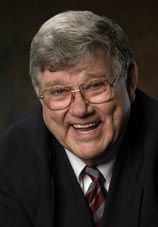|
 |
| Teachers.Net Gazette Vol.6 No.3 | March 2009 |
Subscribe for free home delivery |
|
Fifty Years of Teaching | ||
| by Bill Page www.teacherteacher.com Continued from page 3 March 1, 2009 |
||
 Here are some observations, beliefs, and definitions that made a difference in my teaching: “Motivation is only half a word. The other half is “to what.” Motivation to what? Do you want me to motivate a kid to eat spinach or ice cream? We’re not talking about motivation; we’re talking about spinach and ice cream.” “Kids don’t just flunk; they flunk what I teach, the way I teach it, with the information I give, the examples I use, vocabulary I use, and with the assignments, tests, grades, and experiences for which I am responsible.” “The alternative to flunking kids is teaching them. I don’t get paid to flunk kids. I get paid to teach them. And, so I do.” “Teachers do not teach classes. They teach individuals (in classes). No class has ever learned anything; only individuals learn or fail to learn. Each student in class can learn, all students can learn, but the class does not and cannot learn.” “Motivation equals reason, as in having a reason. I was not motivated to get up this morning – I had a reason to get up. Kids, who have a reason to study, do so.” Those who don’t have a reason, or have conflicting reasons, don’t study.” They need reasons not a carrot or stick. “Whether I have an exciting, interesting class, whether all kids learn or only a few, and whether I have a good class with a good attitude, depends on me not on my kids” “I have a choice; I can complain because students squirm in their seats and admonish them; or I can get them up out of their seats, moving as part of their learning.” “No matter where we are going; we have to begin from where we are – each of us: no matter how convenient it might be to have a predetermined starting point and schedule.” “In the school reform process, teachers are the solution; not the problem. Teachers don’t resist change. What they resist is being changed by bureaucrats. “At-risk students are kids who do not profit from traditional teaching techniques, materials, or procedures. It is a term used to blame kids for school’s inability to meet their needs.” “Teachers don’t always know what to do; but they certainly know some things not to do.” “We must change the foundation in education not merely rearrange the floor plan.” “Given a choice of violating school policy and violating my student’s dignity and worth, I always choose students over policy. Every other teacher chooses between the two, also.” “Slow learning is a matter of coming to a task without the prerequisite knowledge to do that task. We are all slow learners; it depends on our previous learning and on the task.” “Teaching based on traditional methods is obsolete. To continue using the teaching methods of the past isn’t just miseducation; it constitutes malpractice. And, flunking kids is an abuse.” | ||
|


 Bill Page, a farm boy, graduated from a one-room school. He forged a career in the classroom teaching middle school “troublemakers.” For the past 26 years, in addition to his classroom duties, he has taught teachers across the nation to teach the lowest achieving students successfully with his proven premise, “Failure is the choice and fault of schools, not the students.”
Bill Page, a farm boy, graduated from a one-room school. He forged a career in the classroom teaching middle school “troublemakers.” For the past 26 years, in addition to his classroom duties, he has taught teachers across the nation to teach the lowest achieving students successfully with his proven premise, “Failure is the choice and fault of schools, not the students.”